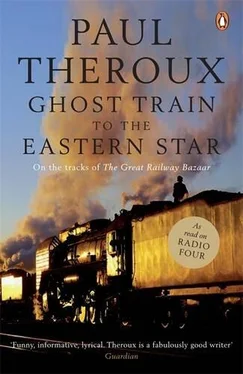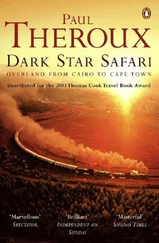What seemed a sprinkling of snow chips in the late afternoon under a darkened sky thickened to a whirling mass of snowflakes and finally a blizzard that entirely obscured Baikal — quite a storm, since it was the largest lake in the world. Out of the snowstorm at Slyudyanka a mob of hawkers, old men and women in fur hats, lifted bags of smoked fish and jostled in the doorway.
"What is this?" I asked Dimitri, who was in a kupe in my coach.
"Is omul. Good wiz beer," Dimitri said.
Omul was a sort of salmon trout found only in Lake Baikal. Prized by Russians, who made an effort to travel all this way to buy this fish, it was sold cold-smoked (stiff and dried) or warm-smoked (soft and fleshy and aromatic). I bought two bags of each.
The fishmongers in the falling snow at Slyudyanka were a glimpse of old Russia, not just their beautiful fur hats and big bulgy coats and thick mittens, but their dark frozen faces, their deeply pitted noses, as they pushed the bags of fish to the potential buyers on the train. A hundred years ago it could not have looked any different: the same boots, the same mittens and furs and ragged scarves, the same waiting on the platform in the storm for the brief stop of the long-distance train, the same look of urgency.
We stopped again at Irkutsk while I feasted on the fish. Darkness fell, the train plowed slowly through the night, and in the morning frost-sparkle, four days on from Vladivostok, in another time zone, one of eight on this train trip, the landscape was unchanged: birches and black saplings in the snowfields passing the mud-flecked window.
A settlement of small cottages covered a whole slope of a hillside.
"Dachas?" I asked Dimitri, just a guess, because there was no smoke in the chimneys. As soon as I said it, I thought: It's a surmise, because travelers are always inventing the country they're passing through.
"Yes," he said. "People from Krasnoyarsk, they come here in the summer."
"It's a whole village."
"Not a village," Dimitri said. "A station."
"What's the difference?"
"No post office. No shop. No school," he said. He was making a distinction between a seasonal camp and a real settlement.
Dimitri was from Krasnoyarsk, an hour down the line. He had studied mining at the local university. It was a city of mines — I saw many from the train — some of them gold mines, surface diggings. Gold has been mined this way in Russia for more than three hundred years.
What interested me about Dimitri was that he was completely satisfied, as a Russian worker, a resident of Krasnoyarsk, a voter and householder and citizen. As we were talking in the corridor of the train, his cell phone rang.
He answered it, and when he was through talking he said, "That was my boss. He knew I was on the train. He wants me to work today. It's okay. I like my work."
He was employed by a company that made mining equipment that was shipped all over the country, even to distant Kolyma and Vladivostok.
Dimitri was about thirty, not tall but muscular. He skied in the hills around Krasnoyarsk, he rode his motorcycle in better weather, he lifted weights. He had his own apartment but was looking for a bigger one, "maybe when I get married." He drove a new Toyota Corolla. He wanted a Lexus. He was ambitious but contented, not a boozer, a nonsmoker — that rare individual, a sober, happy Russian.
He had no desire to travel, except to Moscow and St. Petersburg. He said he wished he spoke English better.
"Your English is fine."
He tapped his front teeth. "You say 'teef' or 'teet'?"
"Teeth."
"Teef," he said.
"I have thirty-two teeth."
"I have feerty-two teef," he said.
Muttering this mantra, he got off the train with the paperbacks I'd read — three Simenons, the Murakami, and the yakuza book. I bought apple juice, yogurt, salami, bread, and smoked salmon from a babushka at the improvised market on the platform at Krasnoyarsk, and I picnicked in my compartment and watched Siberia go past.
Snow, birches, huddled cottages, crows, distant ridges "eyelashed with firs," trackless snow all day, and then another night in the train. By now I was stuporous in the daytime and spent my nights dreaming, waking exhausted from the variety. Memorial services figured in two dreams, orations (by me) in one, flying (by me) in two, and in a memorable dream I was visited by my dead father, who explained, "I'm just checking in."
The previous night, my fifth on the train, we passed through Omsk, where Dostoyevsky had spent four years imprisoned. He'd written about it vividly in The House of the Dead.
Staring at the dense pine forest — the taiga — I drowsed all day, intermittently writing about my father, knowing that towards midnight on this sixth day I would be getting off at the city of Perm. We passed Ishim, where there were tire tracks on the frozen rivers: in winter, Siberian rivers serve as thoroughfares for vehicles. At Tyumen around noon, I bought some chicken from an old woman on the snowy platform, and late in the afternoon, around five, at Yekaterinburg, city of regicide. Guided tours were advertised of the site where the czar and his family had been shot in 1918. Yekaterinburg was the first substantial city I'd come to on the line — it had been named Sverdlovsk on my earlier trip, when I'd arrived on Christmas Eve, at precisely the same time of day. Then, watching a boy hoist his dead father in a stretcher off the train, my depression was complete. This time, I thought: We're on time, we'll arrive in Perm at midnight, and — as I had not washed for a week — I'll probably have a bath.
***
"PERM IS A MODERN INDUSTRIAL city that most travelers could bear to miss," the guidebook said. But surely that was just as inaccurate as this same guidebook's rubbishing my Great Railway Bazaar as "caustic," with travel guide solemnity and philistinism. My visit to Perm was to be memorable and enlightening, especially in the snow-muffled silence of the Siberian winter.
"We were on a secret Pentagon list of Soviet cities to be destroyed!" a Permian man boasted to me soon after I arrived. Because of its rocket factories, its cannon plants, and its manufacture of explosives, Perm was closed to foreigners when I passed through in 1973. Perm was another transit point for Siberian slave labor — had been so since czarist times — and out of town had some of the largest and fiercest prisons in the gulag. Rocket-making, arbitrary incarceration, and torture were the industries in Perm until just the other day when, in February 1992, the prison here was closed and foreigners were allowed to visit, to attend the ballet, to eat juicy posikunchiki ("pissing dumplings") in the good restaurants, to wander the snowy streets, to watch the local fatties jump naked into holes chopped in icy ponds, to drive among the empty hills, the taiga, the mixed forest, through tiny wooden one-story villages, and to see the worst gulag, Perm 36—all of which I managed to do.
Tiny crystals of frost shone in the lights of the main station — not the same station that Yuri Zhivago detrains at in the second part ("Train to the Urals") of Doctor Zhivago, when he first sets eyes on the city. Perm looked much the same today: "It clung to the summit of the hill in tiers, house by house and street by street, with a big church in the middle of the top, as in a cheap color print of a desert monastery or of Mount Athos." Much of the action of that mournful fifty-year-old novel of love and struggle takes place in Perm, called Yuriatin, "another territory, a different, provincial world, which had a center of gravity of its own."
A city or a landscape that has been described in a novel, even in a distorted way, is made more visible and accessible, even hallowed, with a quality of everlastingness. So I was happy to be in Perm and off the train, but I had become so used to the train's vibrations and my narrow berth, I could hardly sleep in my hotel bed. I was like a startled child in a cradle that had ceased to rock.
Читать дальше












